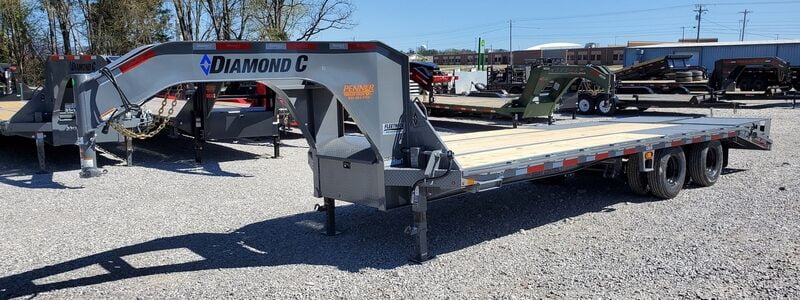If you’re looking to purchase a trailer for your pick-up truck, it can be tough to know which type is best for your specific needs. There are many options available, including enclosed trailers, equipment trailers, flatbed trailers, utility trailers, dump trailers, gooseneck trailers, and more. While each type offers different capabilities, the gooseneck trailer is one of the best options out there.
Gooseneck Trailer Explained
A gooseneck trailer is attached to the truck via a ball and hitch in the bed of the truck as opposed to other types of trailers that are attached to the bumper. It looks like a “gooseneck” because of the way the arm extends over and into the bed of the truck. This type of security offers more stability when driving and can typically haul heavier cargo. It is most commonly used to pull industrial equipment, heavy material, or livestock.
Types of Gooseneck Trailers
While all gooseneck trailers attach to the bed of the truck in the same manner, there are many different bed types to choose from. Flatbed gooseneck trailers typically have a long, full deck with no rails. This allows for easy loading and unloading, in addition to the ability to haul more weight.
Gooseneck utility trailers are similar to flatbed trailers in that they have long decks perfect for hauling heavy machinery. The main difference here is utility trailers typically have rails, which simply offer more support when towing. In general, gooseneck trailers have a threshold of 14,000 pounds of load capacity.
If you need to haul trash, consider a gooseneck dump trailer. Because gooseneck trailers don’t sway as much as their bumper pull counterparts, this can be an excellent way to haul heavy waste materials and machinery to the dump.
Pros of Gooseneck Trailers
Pros of choosing a gooseneck trailer over a bumper pull trailer include:
- Ability to haul heavier loads
- Easier to drive
- Less swaying when driving
- Tighter turn radius
- More control and stability
Cons of Gooseneck Trailers
Gooseneck trailers are built stronger than bumper pull trailers, can carry heavier loads, and offer more safety and stability when driving. Because of this, the main disadvantage of a gooseneck trailer is going to be the expense. Not only do these trailers cost more themselves, but they also require a special hitch to be installed in the bed of the truck. Gooseneck trailers can also only be towed by trucks, as opposed to bumper pull trailers that can be towed by SUVs or cars.
How Much Do Gooseneck Trailers Cost?
New gooseneck trailers can cost $20,000 or more depending on the size and type of trailer you prefer. Used gooseneck trailers typically range between $6,000 and $20,000, but again this will vary depending on the year built, condition that it’s in, make and model, and towing capacities of the trailer.
You’ll also need to install a gooseneck hitch on your truck, which ranges from $800 to $1,200. You can choose to have it professionally installed or you can install it yourself if you’re looking to cut back on expenses. Once installed, the hitch should last at least 10-15 years if maintained well.
Where Can I Buy a Gooseneck Trailer?
Many dealers offer new and used gooseneck trailers for sale throughout the country. We recommend starting with a local gooseneck trailer search first, and then branching out to neighboring states. If you’re near Winchester, TN, visit our team at Penner Trailer Sales for your next trailer purchase.
Overall, gooseneck trailers provide much more stability and towing capabilities than traditional trailers. Whether you’re looking to haul heavy machinery, cargo, or livestock, a gooseneck trailer can offer the support and safety that you need.


